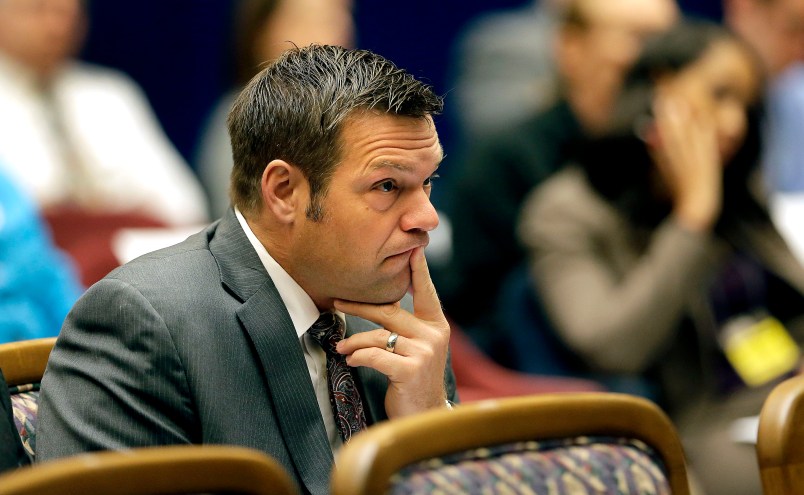Kansas Secretary of State Kris Kobach (R) isn’t backing down after the state Supreme Court blocked him from keeping Democratic Senate nominee Chad Taylor on the November ballot. He is now demanding that the Democratic Party select a new candidate, arguing that state law requires it.
What Kansas Democrats are actually going to do, though, remains unclear. If, as is widely believed, Taylor’s withdrawal was a ploy by the party to funnel Democratic voters to independent candidate Greg Orman and unseat long-time incumbent Republican Sen. Pat Roberts, naming a new nominee doesn’t make much sense. But Kobach seems intent on forcing the issue.
A spokesperson for Kobach confirmed to TPM that he believed state law required the party to fill the vacancy. He said he would consider suing the Democratic Party to compel them to name a replacement if they didn’t do it on their own.
A Thursday statement on the court ruling from Kansas Democratic Party Chair Joan Wagnon didn’t address what Democrats would do next.
“I applaud the Kansas Supreme Court decision to follow the law and stop Kris Kobach from undermining Kansas democracy. Kris Kobach has proven he cannot be trusted to fairly enforce the law,” Wagnon said in the statement. “So long as Kris Kobach is Kansas Secretary of State, democracy is threatened.”
But earlier in the week, according to the Wichita Eagle, Wagnon said: “Until the court tells me to do something, I’m not going to do anything.”
The court explicitly said in its Thursday decision that it was not ruling on whether Democrats must replace Taylor.
A Kansas Democratic Party spokesperson did not immediately respond to TPM’s requests for comment. The Democratic Senatorial Campaign Committee, which has maintained radio silence on the developments in Kansas, declined to comment.
Kobach is trying to put public pressure on Democrats to place somebody new on the ballot. He is delaying the shipment of absentee ballots to military voters from Sept. 20 to Sept. 27, he said Thursday, which would give Democrats time to find a replacement candidate.
“Eight days is more than enough time. If the Democratic Party wishes to play games with our election laws and not nominate a replacement, then I encourage the members of the press corps to ask them why,” Kobach said, according to the Eagle.
According to election law experts like the University of California-Irvine’s Rick Hasen, a lawsuit by Kobach might be his only hope of forcing the issue, though it is far from clear that he would prevail.
Amid all the jockeying, a registered Kansas Democrat jumped in to sue his own party to select a new Democratic nominee. David Orel of Kansas City, Kan., filed the suit just hours after the court ruling took Taylor’s name off the ballot. Orel had already filed an amicus brief in the first lawsuit, arguing that Taylor should be kept on the ballot.
As the Wichita Eagle reported earlier this week, Orel’s son Alexander is a campaign staffer for Republican Gov. Sam Brownback. Orel’s attorney, Thomas Haney, told TPM that Orel “has advised me he does not want to be interviewed regarding this.”
“Because (Orel), like many other Kansans, intends to vote for a Democratic candidate in November’s senatorial election,” Haney wrote in the new lawsuit, “any failure to provide such a candidate drastically undermines these individuals’ ‘portion of (the) sovereign power to vote.”










Surely there is a registered democrat somewhere in Kansas named Pat Roberts… Find him, put him on the ballot, and let Kobach deal with it.
You don’t have to put a member of your own party on the ballot as your nominee. Declare Kris Kobach the Democratic candidate
Someone in another thread says Dems should pic a candidate named “Roberts.” I love that idea.
you can taste their fear
The 13th Amendment says they don’t have to.